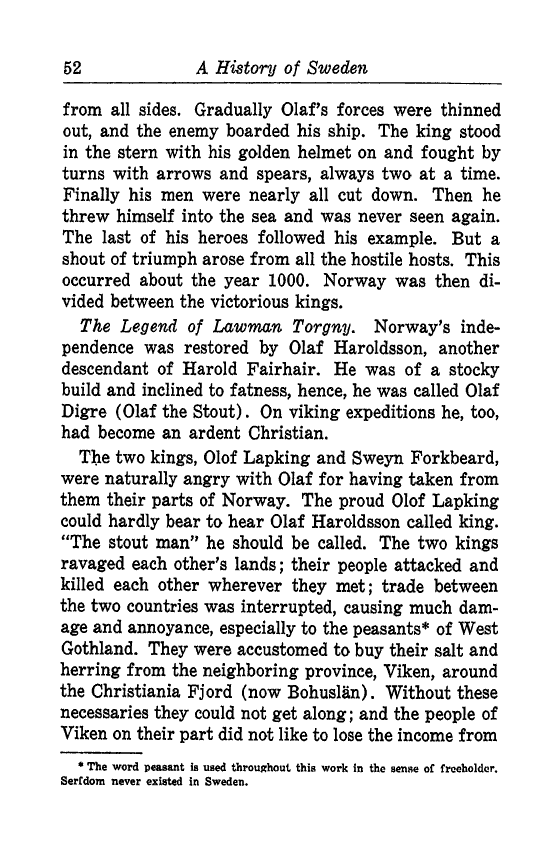
Full resolution (TIFF) - On this page / på denna sida - III. Period of the Vikings and Introduction of Christianity - C. Legendary Tales

<< prev. page << föreg. sida << >> nästa sida >> next page >>
Below is the raw OCR text
from the above scanned image.
Do you see an error? Proofread the page now!
Här nedan syns maskintolkade texten från faksimilbilden ovan.
Ser du något fel? Korrekturläs sidan nu!
This page has never been proofread. / Denna sida har aldrig korrekturlästs.
52 A History of Sweden
from all sides. Gradually Olaf’s forces were thinned
out, and the enemy boarded his ship. The king stood
in the stern with his golden helmet on and fought by
turns with arrows and spears, always two at a time.
Finally his men were nearly all cut down. Then he
threw himself into the sea and was never seen again.
The last of his heroes followed his example. But a
shout of triumph arose from all the hostile hosts. This
occurred about the year 1000. Norway was then di-
vided between the victorious kings.
The Legend of Lawman Torgny. Norway’s inde-
pendence was restored by Olaf Haroldsson, another
descendant of Harold Fairhair. He was of a stocky
build and inclined to fatness, hence, he was called Olaf
Digre (Olaf the Stout). On viking expeditions he, too,
had become an ardent Christian.
The two kings, Olof Lapking and Sweyn Forkbeard,
were naturally angry with Olaf for having taken from
them their parts of Norway. The proud Olof Lapking
could hardly bear to hear Olaf Haroldsson called king.
"The stout man" he should be called. The two kings
ravaged each other’s lands ;
their people attacked and
killed each other wherever they met; trade between
the two countries was interrupted, causing much dam-
age and annoyance, especially to the peasants* of West
Gothland. They were accustomed to buy their salt and
herring from the neighboring province, Viken, around
the Christiania Fjord (now Bohuslan). Without these
necessaries they could not get along; and the people of
Viken on their part did not like to lose the income from
* The word peasant is used throughout this work in the sense of freeholder.
Serfdom never existed in Sweden.
<< prev. page << föreg. sida << >> nästa sida >> next page >>